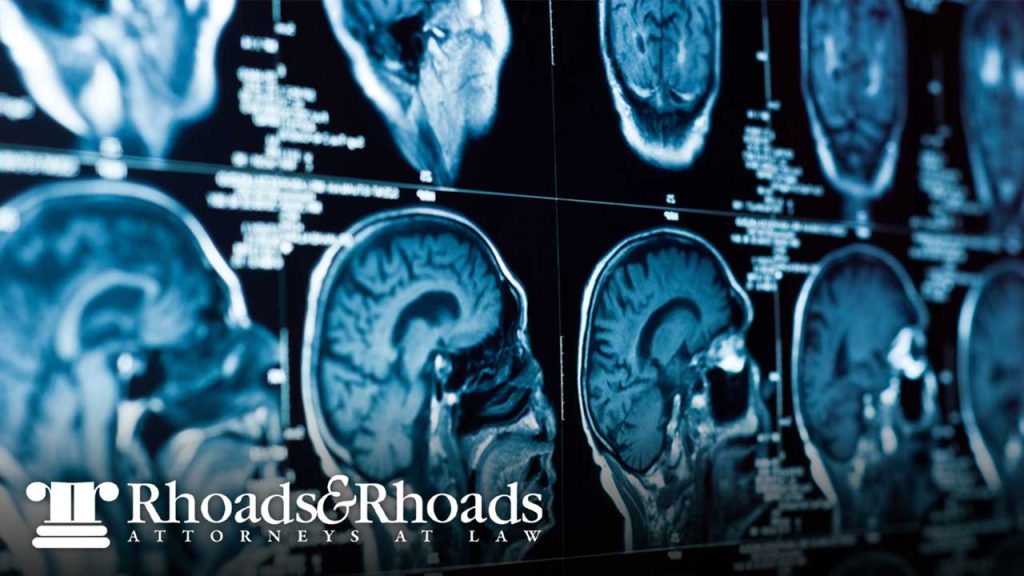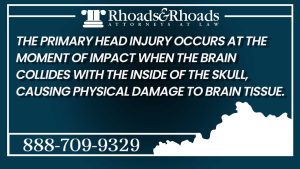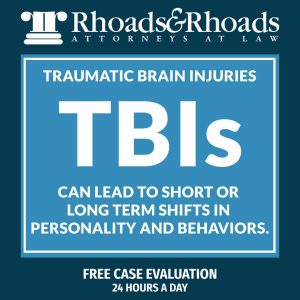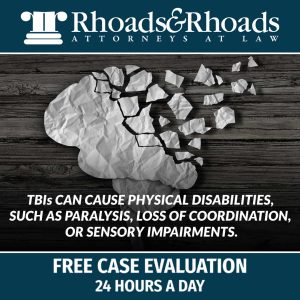
According to the Centers for Disease Control reports there were more than 214,000 TBI-related hospitalizations in 2020 from car accidents, falls, and other injuries. The most severe injury, diffuse axonal injury (the tearing of the brain as it twists within the skull) is often fatal.
 Traumatic Brain Injuries (TBIs) are devastating brain injuries that can impact every aspect of the victim’s life.
Traumatic Brain Injuries (TBIs) are devastating brain injuries that can impact every aspect of the victim’s life.
The impact of even a mild TBI extends far beyond the individual directly affected, reshaping the lives of family members and loved ones. Families of brain injury victims often find themselves in unfamiliar caregiving roles, navigating emotional upheaval and grappling with significant lifestyle adjustments.
A brain injury victim and their loved ones face uncertainty and change, requiring adaptability, resilience, and unwavering support.
In this article, we delve into the profound effects of Traumatic Brain Injuries on families, exploring the emotional, practical, and relational struggles and offering guidance on how to navigate the challenges brain injury victims face. We will also explore how Rhoads & Rhoads experienced brain injury lawyers can help you recover compensation you deserve.
Rhoads & Rhoads | Your Ally In a Traumatic Brain Injury Lawsuit
Rhoads & Rhoads Traumatic Brain Injury lawyers in Kentucky stand out as the best injury attorneys to have on your side.
Decades of Experience: With over 50 years of dedicated service to the Owensboro, Madisonville and surrounding communities, Rhoads & Rhoads has amassed extensive experience in handling a wide range of personal injury cases, including traumatic brain injuries.
Proven Track Record: Rhoads & Rhoads brain injury law firm also has a track record of success in securing favorable outcomes for our clients. Their history of successful verdicts and settlements demonstrates their effectiveness in representing head injury victims and their families.
Specialization in Brain Injury Cases: Rhoads & Rhoads brain injury lawyers specialize in recovering fair compensation through brain injury lawsuits. Their Traumatic Brain Injury attorneys have the knowledge, skills, and resources to navigate Traumatic Brain Injury law and litigation.
Compassionate Approach: Beyond legal expertise, each Rhoads & Rhoads brain injury lawyer is known for its compassionate approach to clients suffering physical and emotional pain.
Local Knowledge and Commitment: As a Kentucky Traumatic Brain Injury law firm deeply rooted in the Owensboro and Madisonville communities, Rhoads & Rhoads Traumatic Brain Injury attorneys have mastered local laws, regulations, and court systems.
Client-Centered Representation: Rhoads & Rhoads brain injury lawyers prioritize the needs and interests of their clients. Their brain injury lawyers advocate for their clients’ rights and pursue maximum compensation for their injuries, damages, and losses.
No-Risk Representation: The Traumatic Brain Injury law firm offers representation on a contingency fee basis, meaning clients pay nothing unless they win or settle their case. This no-risk approach demonstrates their confidence in their ability to deliver results for their clients.
What is Traumatic Brain Injury (TBI)?
 Traumatic Brain Injury is a severe condition resulting from a sudden, violent blow or jolt to the head or penetrating head injury that disrupts the normal function of the brain. Traumatic Brain Injury can range from a mild concussion to severe, life-altering, and serious brain injuries, with effects that extend far beyond the initial incident.
Traumatic Brain Injury is a severe condition resulting from a sudden, violent blow or jolt to the head or penetrating head injury that disrupts the normal function of the brain. Traumatic Brain Injury can range from a mild concussion to severe, life-altering, and serious brain injuries, with effects that extend far beyond the initial incident.
In this article, we will explore what a Traumatic Brain Injury is, its common causes, the impact it can have on an individual’s life, medical bills with extensive medical costs, and the legal recourse available to those who have suffered such injuries due to someone else’s negligence.
Call Rhoads & Rhoads today at 888-709-9329 so a head injury attorney can review your case and determine if a brain injury lawsuit is warranted.
What Happens During a Traumatic Brain Injury?
 TBIs occur when the victim’s head hits a solid surface or their head violently moves in a way that damages the brain. They range from mild Traumatic Brain Injury to severe or even death. Victims who survive may suffer from a temporary loss of consciousness, memory loss, or permanent neurological or brain damage.
TBIs occur when the victim’s head hits a solid surface or their head violently moves in a way that damages the brain. They range from mild Traumatic Brain Injury to severe or even death. Victims who survive may suffer from a temporary loss of consciousness, memory loss, or permanent neurological or brain damage.
The outcomes of Traumatic Brain Injuries depend on the severity and type of Traumatic Brain Injury, which may include:
- Primary Brain Injury: The primary head injury occurs at the moment of impact when the brain collides with the inside of the skull, causing physical damage to brain tissue. Even in a mild Traumatic Brain Injury, this type of closed head injury can result in a cerebral contusion, a brain bleed, a nerve fiber tear, and other structural brain damage.
- Secondary Brain Injury: Following the initial impact, secondary Traumatic Brain Injury processes can occur, exacerbating the damage to the brain over time. These processes may include inflammation, swelling (edema), and changes in blood flow, which can further compromise brain function and lead to additional cell death.
- Chemical Changes: A Traumatic Brain Injury can disrupt the balance of chemicals and neurotransmitters in the brain, affecting communication between nerve cells. This disruption can impair cognitive function, mood regulation, and other essential processes.
- Cellular Damage: The force of a Traumatic Brain Injury can cause widespread damage to brain cells, including neurons (nerve cells), glial cells (support cells), and blood vessels. This damage can disrupt neural circuits and impair the brain’s ability to transmit signals effectively.
- Axonal Brain Injury: Axonal brain injury occurs when the long, slender projections of nerve cells (axons) are stretched, torn, or sheared due to rotational or acceleration-deceleration forces. This type of traumatic brain injury can disrupt communication between different areas of the brain and lead to cognitive and sensory deficits.
- Ischemia: In severe Traumatic Brain Injuries, there may be a disruption of blood flow to some regions of the brain, leading to ischemia (lack of oxygen) and subsequent cell death. Ischemic damage can result in permanent neurological deficits and complications.
As with any head injury, a Traumatic Brain Injury ranges from temporary symptoms such as confusion and headaches to long-term head injury related cognitive, physical, and emotional impairments.
Common Causes of Traumatic Brain Injury

Any head injury or brain damage (even a mild TBI) can result from various accidents and incidents, including:
- Motor Vehicle Accidents: Collisions involving cars, trucks, motorcycles, bicycles, or pedestrians can all lead to brain trauma, especially if the head sustains a direct impact or sudden jolt. Axonal injury is most common in high-speed car accidents.
- Falls: Falls are a leading cause of Traumatic Brain Injury, particularly among children and the elderly. Slip-and-fall accidents, falls from heights, or workplace accidents can all result in head injuries.
- Assaults: Intentional acts of violence, such as assaults or physical altercations, can cause Traumatic Brain Injury due to blunt force trauma to the head.
- Sports Injuries: High-impact sports like football, soccer, and boxing carry a risk of head injuries, especially if proper safety precautions are not taken.
- Workplace Accidents: Workers in construction, manufacturing, or other hazardous industries may be at risk of Traumatic Brain Injury due to falls, equipment malfunctions, or other workplace hazards.
Impact of Traumatic Brain Injury on The Person Injured
The effects of a TBI can be profound and long-lasting, impacting various aspects of an individual’s life, including:

- Cognitive Functioning: TBIs can impair memory, attention, concentration, and decision-making skills, making it challenging to perform everyday tasks or hold down a job.
- Physical Functioning: Depending on the severity of the brain injury, TBIs can cause physical disabilities, such as paralysis, loss of coordination, or sensory impairments.
- Challenges with Communication: TBIs can impact language skills, speech clarity, and comprehension, leading to difficulties in communication.
- Emotional Well-Being: Individuals with TBIs may experience mood swings, depression, anxiety, or other emotional disturbances, affecting their overall quality of life and relationships with others.
- Financial Burden: The cost of medical treatment, rehabilitation, and ongoing care for TBI can be substantial, placing a significant financial strain on individuals and their families.
- Social Functioning: TBIs can disrupt social interactions and relationships, leading to isolation, difficulty maintaining friendships, and challenges in participating in social activities.
- Occupational Challenges: Individuals may struggle to return to work or maintain employment following a TBI due to cognitive impairments, physical limitations, or changes in behavior.
- Educational Impacts: For children and adolescents with TBIs, there may be significant challenges in academic settings, including difficulties with learning, memory, and concentration, as well as disruptions to educational progress and attainment.
- Impact on Daily Living Activities: TBIs can affect the ability to perform basic activities of daily living independently, such as bathing, dressing, cooking, and managing household tasks, requiring ongoing assistance and support from caregivers.
- Changes in Personality: TBIs can lead to short or long term shifts in personality and behaviors, such as impulsivity, irritability, aggression, or apathy.
How Do Traumatic Brain Injuries Impact The Victim’s Family?

When it comes to traumatic brain injuries (TBIs), the impact of mild Traumatic Brain Injury extends far beyond the injured. The lives of family members are often profoundly affected, and their roles may undergo significant changes in the aftermath of a more severe TBI.
Imagine suddenly having to navigate a world where your loved one, who was once vibrant and independent, now requires constant medical care and support. It’s a reality that many families face, and it can be incredibly challenging to adjust to this new normal.
Family members often find themselves taking on caregiving responsibilities that they never anticipated.
Whether it’s assisting with daily tasks, managing medications, or providing emotional support, the demands can be overwhelming. Many caregivers also experience feelings of guilt, frustration, and isolation as they grapple with the challenges of caring for a loved one with a TBI.
In addition to the practical aspects of caregiving, family members may also need emotional support to cope with the changes in their lives.
Counseling and therapy can be invaluable resources for helping family members navigate their feelings of grief, loss, and uncertainty. By seeking professional help, they can learn coping strategies, develop healthy boundaries, and find ways to prioritize their physical health and well-being amidst the demands of caregiving.
Learning how to communicate effectively and provide specialized medical care is essential for both the injured individual and their caregivers.
In essence, the impact of a TBI reverberates throughout the entire family unit, reshaping relationships, roles, and routines. While the journey may be fraught with challenges, family members need to remember that they are not alone.
It’s essential to hire an experienced brain injury lawyer who can help you seek compensation for the victim’s injury, families have the resources to pay for support, education, and caregivers.
When Can Traumatic Brain Injury Lawyers Help You Seek Damages and Sue for Damages?

If you have suffered a Traumatic Brain Injury caused by someone else’s negligence or wrongful conduct, you may be entitled to compensation for your damages.
While your head injury lawyer needs to evaluate your unique situation, common Traumatic Brain Injury lawsuits stem from these services:
- Motor Vehicle Accident: If another driver’s negligence caused the automobile accident itself, resulting in your TBI, you may be able to file a personal injury lawsuit to recover damages for your medical costs and expenses, lost wages, pain and suffering, and other losses.
- Premises Liability: If you suffered a TBI due to a slip-and-fall, trips-and-fall, car accident, or other dangerous conditions on someone else’s property, you may have grounds for a premises liability claim.
- Workplace Accident: Employers have a legal obligation to provide a safe work environment for their employees. If you sustained a TBI during work or at the workplace or even through employer negligence, you may be eligible for workers’ compensation benefits or pursue a personal injury lawsuit against the responsible party.
- Assault or Battery: If you suffered a TBI as a result of intentional harm inflicted by another person, such as in cases of assault or battery, you might have grounds for a civil lawsuit to seek compensation for your injuries and damages.
- Product Liability: In some cases, a defective product may contribute to or directly cause a Traumatic Brain Injury. Whether it’s a faulty car part, defective safety equipment, or hazardous consumer product, manufacturers and distributors can be held liable for any brain injuries resulting from their negligence or failure to provide adequate warnings.
- Medical Malpractice: If a healthcare professional’s negligence or substandard care leads to a Traumatic Brain Injury, you may have a medical malpractice claim. This could include situations of medical negligence such as surgical errors, misdiagnosis during medical examination, medication errors, or inadequate treatment following a brain injury.
- Sports Injury: While participating in sports carries inherent risks, certain situations may involve negligence or recklessness on the part of coaches, trainers, or other individuals responsible for player safety.
- Nursing Home Abuse or Neglect: Elderly individuals residing in nursing homes or assisted living facilities may be vulnerable to abuse or neglect, which can result in serious injuries, including Traumatic Brain injury.
- Recreational Accident: Injuries sustained during recreational activities, such as amusement park rides, recreational sports, ATV”s, or outdoor adventures, can sometimes lead to traumatic brain injuries.
- Defective Safety Equipment: If a defective helmet, seatbelt, airbag, or other safety equipment fails to provide adequate protection during a car accident or accident, resulting in a Traumatic Brain Injury, you may have a product liability claim against the manufacturer, distributor, or retailer of the faulty equipment.
- Dog Bites or Animal Attack: Dog bites and animal attacks can cause serious injuries, including traumatic brain injuries, especially if the victim is knocked to the ground or struck in the head during the attack.
- Intentional Tort: You may have a case if someone intentionally causes harm that results in a traumatic brain or head injury, such as in cases of assault, battery, or intentional infliction of emotional distress.
- Government Liability: If a Traumatic Brain Injury occurs as a result of negligence or wrongdoing by a government entity or employee, such as in cases of inadequate road maintenance, unsafe public facilities, or medical professional negligence or malpractice in government-run healthcare facilities, you may have a claim under the doctrine of governmental immunity or other applicable laws.
These types of lawsuits are particularly challenging, and proceeding without an experienced Traumatic Brain Injury lawyer is not advised:
- Public Transportation Accident: If you sustain a Traumatic Brain Injury while riding on public transportation, such as buses, trains, or subways, due to negligence on the part of the transportation authority, operator, or another party, you may have grounds for legal action to pursue compensation for your injuries and losses.
If you or a loved one has experienced a Traumatic Brain Injury due to someone else’s negligence or wrongful conduct, seeking legal guidance from experienced brain injury lawyers is crucial to protect your rights.
Whether it’s a motor vehicle accident, premises liability incident, workplace injury, assault, or any other scenario mentioned above, a skilled Traumatic Brain Injury lawyer can help you navigate the complexities of the legal system and advocate for your best interests.
Don’t hesitate to reach out to our brain injury lawyers today to find out what your options are for seeking justice for your damages. Call the firm today at 888-709-9329.
Why You Deserve The Best Traumatic Brain Injury Lawyers

Receiving a Traumatic Brain Injury is a life-altering event that can have far-reaching consequences for both the individual and their loved ones. When someone else’s negligence or wrongful conduct is responsible for causing your injury, seeking legal representation from a personal injury and Traumatic Brain Injury attorney is crucial.
Here’s why you need an experienced Traumatic Brain Injury lawyer to help you prove liability and recover compensation:
- Navigating Complex Legal Processes: The legal landscape surrounding personal injury cases, especially those involving traumatic brain injuries, can be incredibly complex. From gathering and developing evidence to negotiating with insurance companies to navigating court proceedings, there are numerous legal hurdles to overcome.
- Determining Liability: Identifying who is at fault for causing the Traumatic Brain Injury is a critical aspect of any personal injury case. A knowledgeable Traumatic Brain Injury attorney will conduct a thorough investigation into the circumstances surrounding your injury to determine liability.
Whether it’s a negligent driver, a negligent property owner, or a negligent employer, your Rhoads & Rhoads head injury lawyer will work tirelessly to hold the responsible parties accountable for their actions. Call us today at 888-709-9329.
Protecting You From Insurance Companies With Ulterior Motives
The best brain injury lawyers are your go-to ally when dealing with insurance companies after an injury. The brain injury lawyer handles all the complicated paperwork and negotiations, making sure you get the fair compensation you deserve. With their expertise, head injury lawyers gather evidence and fight for your rights, whether through settlement talks or in court.
Here are a few key ways Traumatic Brain Injury Lawyers take care of the legal side of your Traumatic Brain Injury:

- Maximizing Compensation: Traumatic brain injuries can result in significant medical expenses, lost wages, and pain and suffering. Without legal representation, you may miss out on the full extent of damages to which you are entitled. A skilled Traumatic Brain Injury attorney will assess the impact of the Traumatic Brain Injury on your life and pursue maximum compensation on your behalf. This may include compensation for medical bills, rehabilitation costs, lost income, future medical expenses, and non-economic damages such as pain and suffering.
- Leveling the Playing Field: When you’re up against insurance companies and their team of Traumatic Brain Injury lawyers, it can feel like an uphill battle. Insurance companies often try to minimize payouts or deny claims altogether to protect their bottom line. By hiring a personal injury attorney, you level the playing field and ensure that your rights are protected. Your Traumatic Brain Injury attorney will negotiate with insurance companies on your behalf and fight for the compensation you deserve.
- Focus on Recovery: Dealing with the aftermath of a Traumatic Brain Injury is physically, emotionally, and mentally exhausting. By entrusting your case to a personal injury attorney, you can focus on what matters most – your recovery. Your traumatic brain attorney will handle all aspects of your case, allowing you to concentrate on getting the medical treatment and support you need to move forward with your life.
Expert head injury lawyers can help you prove negligence if you suffer Traumatic Brain Injury due to someone else’s wrongful conduct. With their expertise and guidance, you can navigate the complexities of the legal system and pursue the compensation you deserve for your injuries and losses.
Seek legal representation from an experienced Traumatic Brain Injury attorney as soon as possible, after seeking immediate medical attention for your injuries. Call Rhoads & Rhoads today at 888-709-9329.

The Process of Suing for Damages
Suing for damages in a Traumatic Brain Injury lawsuit can be complex and overwhelming. From initial consultation with a head and brain injury attorney to potential trial proceedings, each step requires careful consideration and strategic planning.
Below are the key stages involved in seeking compensation for your Traumatic Brain Injury and understand how experienced personal head and brain injury lawyers can guide you through this journey:
- Consultation with a Traumatic Brain Injury Attorney: Seek legal advice from an experienced personal and Traumatic Brain Injury attorney specializing in Traumatic Brain Injury cases. They can evaluate the merits of your Traumatic Brain Injury case, explain your legal rights, and guide you through the legal process.
- Investigation and Evidence Gathering: Your brain and head injury attorney will conduct a thorough investigation into the circumstances surrounding your Traumatic Brain Injury, gathering evidence such as eyewitness statements, accident reports, identifying safety standards, obtaining medical records, and expert opinions to support your claim. They will also examine medical records related to your head injury and evaluate methods to further diagnose and prove your injury.
- Filing a Lawsuit: If a settlement cannot be reached through negotiation with the at-fault party or their insurance company, your brain injury attorney may file a lawsuit on your behalf, initiating the formal legal proceedings.
- Discovery Phase: Under brain injury law, the at-fault party’s lawyer and your brain injury lawyer exchange information and evidence relevant to the case during the discovery phase. These materials may include written interrogatories, depositions, and requests for documents related to the case.
- Negotiation and Settlement: Your brain injury attorney will negotiate with the opposing party to reach a fair settlement agreement that compensates you for your damages. If a settlement cannot be reached, your case may proceed to trial.
- Trial: If your case goes to trial, your Traumatic Brain Injury lawyer will present your evidence and arguments before a judge and jury, seeking a favorable verdict in your favor.
- Appeal (if necessary): In some cases, either party may choose to appeal the court’s decision if they believe legal errors were made during the trial process. Your brain injury law expert can help you file the appeal before the deadline.
Seek Legal Assistance for Your Traumatic Brain Injury Claim
 Traumatic brain injuries have devastating physical, emotional, and financial consequences, affecting every aspect of an individual’s life. If you have suffered a TBI due to someone else’s medical negligence or wrongful conduct, it’s essential to work with a Traumatic Brain Injury lawyer who understands your legal rights and options for seeking compensation.
Traumatic brain injuries have devastating physical, emotional, and financial consequences, affecting every aspect of an individual’s life. If you have suffered a TBI due to someone else’s medical negligence or wrongful conduct, it’s essential to work with a Traumatic Brain Injury lawyer who understands your legal rights and options for seeking compensation.
If you or a loved one suffer a Traumatic Brain Injury, call Rhoads & Roads today. Our team of experienced Traumatic Brain Injury attorneys and knowledgeable support staff will provide you with reliable, legal services and advice.
As brain injury attorneys, our number one goal is to get you the financial compensation you deserve.
Schedule a free consult today with Rhoads & Rhoads to work with Kentucky’s best brain injury lawyer so we can help you prove negligence and get the compensation you deserve.
Rhoads & Rhoads, brain injury lawyers, have been protecting the rights of the injured throughout Western Kentucky for over 50 years. Call us today at 888-709-9329.


